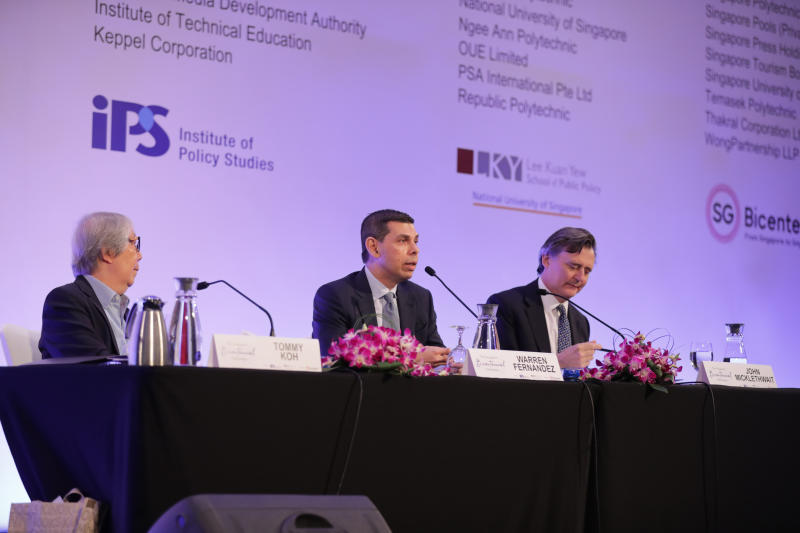How much has China learnt from Singapore? The two are fundamentally different, say panellists
Sign up now: Get ST's newsletters delivered to your inbox

(From left) Professor Tommy Koh, Straits Times editor Warren Fernandez and Bloomberg News editor-in-chief John Micklethwait during a dialogue at the Singapore Bicentennial Conference on Oct 1, 2019.
ST PHOTO: GIN TAY
Follow topic:
SINGAPORE - A question on the relationship between China and Singapore sparked a rigorous debate at the Singapore Bicentennial Conference on Tuesday (Oct 1).
Institute of Policy Studies deputy director for research Gillian Koh had pointed to a New York Times article on China. Its author had argued that one reason for the longevity of the Chinese Communist Party's regime is that it has taken a leaf from how Singapore is governed.
Professor Tommy Koh, who is an Ambassador-at-Large, said this comparison is inappropriate as there are fundamental differences in the political systems of both countries.
Unlike Chinese citizens, Singaporeans enjoy universal suffrage and many political parties are allowed to contest for power in regular, bona fide elections, he pointed out at a dialogue moderated by Straits Times Editor Warren Fernandez.
"I would never dream of comparing China with Singapore, because they're so incredibly different," responded Mr John Micklethwait, who is Bloomberg News editor-in-chief. "But I do think it is fair to say that China could learn from Singapore about government, and I think, used to quite a lot." He added that the level at which China seems to be drawing lessons from Singapore seems to have declined slightly.
"Singapore is too small and too unique to be a model for China; for anybody else," Prof Koh responded, adding that it is not true that interactions between both countries have become less intense. Instead, both sides learn from each other today, he said.
"I think what was different, five years ago, when I went to China, there was much more talk about Singapore being something that people were following," Mr Micklethwait said.
Both panellists also gave their views on how US-China relations could pan out. Ties between the two superpowers have become more strained since Mr Donald Trump was elected United States president in 2016.
"I'm a natural-born optimist, but on US-China relations I am pessimistic," Prof Koh said. "I fear that if this rivalry becomes more intense and more acrimonious, each side will not accept neutrality and will expect us to take sides. I hope that day will never come."
Both he and Mr Micklethwait agreed that China's rise goes beyond trade or technology disputes, but poses a more fundamental threat to America's position in the global order.
The current contest between both countries is a very long-term one, Mr Micklethwait said.
"I think the biggest mistake the Chinese made was imagining this was somehow just Trump," he added. "In America, they feel the dragon's breath on their shoulders."

